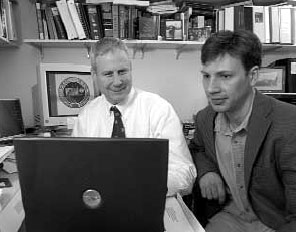A space odyssey: Psychological support in flight
3 . . . 2 . . . 1 . . . blast off! Many people dream of going up in space—the countdown, the snazzy suits, and the weightless environment. But dealing with interpersonal conflicts or depression usually isn't part of such dreams.
Astronaut: Most adults come home from work saying simply, "I had a hard day at the office." But what might the average astronaut say upon coming home from a twoto three-year mission to Mars?

|
|
Dartmouth researchers James Carter, right, and Jay Buckey, left, are trying to capture the essentials
of psychotherapy in an interactive computer program, for use on long space flights. |
According to clinical psychologist James Carter, Ph.D., a senior researcher at DMS's Interactive Media Laboratory, mild depression and interpersonal conflict are among the top medical challenges facing astronauts on long space flights.
To address these problems, Carter and a DMS research team have been developing a self-administered, interactive computer- based psychotherapy program. Called the "Smart Medical System for Psychosocial Support," it currently includes three modules —one focused on depression, one focused on conflict, and one that's a general psychological assessment tool.
The aim of the system is to assess and manage problems such as depression and conflict and prevent them from becoming serious enough to jeopardize a mission. "This program is designed to make sure that the crews are aware of [depression] and know how to detect it," explains Jay Buckey, M.D., an associate professor of medicine at DMS, a former astronaut, and coprincipal investigator for the project.
All the modules will simulate a human presence through the use of virtual mentors—video clips of NASA psychologists and veteran astronauts—who discuss early signs of depression and conflict and lead the user through the program.
The depression module uses problem-solving therapy to help astronauts cope with such difficulties as homesickness and monotony. It guides astronauts through a step-by-step process to identify signs of depression and to set realistic goals to resolve it. Astronauts keep information confidential by storing it on personal CDs. They can then monitor their own progress at any time during the flight.
The conflict module includes video and audio simulations of hypothetical problems that could occur among crew members during a flight. The simulations are performed by professional actors and were shot in a space-station simulator.
Scenario: For example, a scene may show two crew members who have started to chafe at living and working in tight quarters. Eventually, the actors draw the astronaut into the scenario, and the astronaut has to decide how to resolve the tension by choosing from a menu of responses. The chosen response is then played out, and the astronaut can see if it proves to be a workable solution.
After creating scenarios for this module, Carter and Buckey interviewed about a dozen veteran astronauts to get their input. "Most people felt the scenarios were realistic, so I felt that was encouraging," says Buckey. Adds Carter, "We ask how a veteran crew member . . . would handle a situation and ask what kind of pitfalls a novice might do in a situation that wouldn't be so good. There's a wide range of opinions . . . not one obvious best choice."
The team also includes an expert in conflict resolution, Leonard Greenhalgh, Ph.D., a professor of management at Dartmouth's Tuck School. He says that on long space flights, where astronauts work in very small spaces, conflict is inevitable and the key is preventing escalation. "If you can sort out what are the pathways leading to the emotions getting generated, then you can de-escalate" the conflict, he explains.
During the summer of 2003, psychologists and astronauts at NASA's Johnson Space Center in Houston will test a prototype of the system. The next steps will be to finish the initial modules and then add more, including one on anxiety. The prototype is being developed with support from the National Space Biomedical Research Institute.
Potential: Carter says the system also holds potential for use in isolated places on terra firma, such as offshore oil rigs, submarines, or polar outposts. "Even more exciting is making versions of the program for the general public to use in primary-care settings," he adds.
For now, though, the focus is on helping astronauts stay psychologically fit and get along with each other. "You're stuck up there, and so maintaining those relationships is really essential, not just for your own happiness but also for safety," says Carter.
Matthew C. Wiencke
If you would like to offer any feedback about this article, we would welcome getting your comments at DartMed@Dartmouth.edu.
